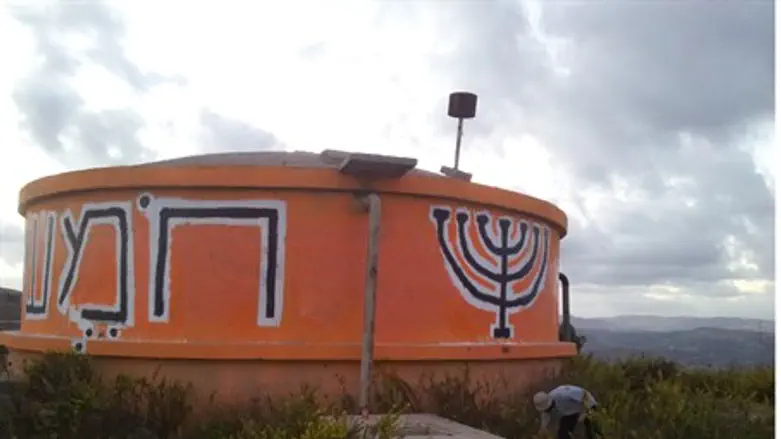
Following an Arab takeover of the former Jewish town of Homesh yesterday - in which demonstrators held anti-Semitic placards, unfurled PLO flags and defaced the town's symbolic water tower - a group of Jewish activists has returned in a bid to undo some of the damage.
Members of the "Homesh First" organization returned to the site to clean the graffiti and repair some of the damage wrought during yesterday's protest by Arab activists.
In a symbolic gesture of defiance, they repainted the image of a menorah (Jewish candelabra) which had been on Homesh's water tower until Arab extremists painted over it and replaced it with anti-Israel slogans.
Homesh First was founded after the expulsion of thousands of Jews from dozens of communities in Gaza and northern Samaria (Shomron) during the 2005 "Disengagement Plan," including from the town of Homesh. The group's aim is to prevent the Arabization of Jewish land in Homesh, following its forced abandonment, and to eventually reestablish all the communities which were destroyed during the Disengagement.
The group's activists attempt to maintain a constant Jewish presence there, regularly returning to the site of the former community to pray and study Torah.
They remained at the site despite frequent expulsions by the Border Police, but were forced to leave when Attorney General Yehuda Weinstein declared that the area was no longer an Israeli community, giving Palestinian Authority residents free access.
In a statement the group said its activists had "deployed to clean the graffiti on the water tower," declaring:
"The seven-branched menorah with the words 'Homesh First' is now proudly perched at the top of the mountain which overlooks [central Israel], from Haifa in the north to until Ashkelon [in the south], and yeshiva students who have been learning Torah in Homesh for the past six years are currently studying in the yeshiva [Torah academy]," the group declared.
In response to claims by left-wing organizations that the land of Homesh belongs to Arabs from the nearby village or Burkah, the group said that such claims were totally baseless.
"If the Arabs of Burkah cared so much about the land then why did they never work it, leaving it completely barren until the establishment of the Jewish settlement 35 years ago?"
"Homesh has always been Jewish land," the group added, "And it will always be Jewish land. With God's help we will return and rebuild the Jewish settlement."
Meanwhile the head of the Shomron Regional Council, Gershon Mesika, called on the government to "do what is good for the Jewish people" and rebuild the community of Homesh, adding that the actions of Arab activists at the site proved that their only interest was in harming Jews "whereas we exhibit love of the Land of Israel" through building communities.
Housing Minister Uri Ariel (Bayit Yehudi/Jewish Home) said that abandoning Homesh "sends the wrong message to the Arabs, the results of which are seen on the ground."
The correct reaction to Arab aggression, he asserted, was to officially approve the reestablished yeshiva set up by Homesh First, and to impose a closure order to prevent an Arab takeover of this strategic site."
Coalition chairman MK Yariv Levin (Likud-Beiteinu) concurred, and called on the Defense Minister - whose ministry is responsible for community affairs in the Judea and Samaria region - to allow for the immediate reopening of the yeshiva.